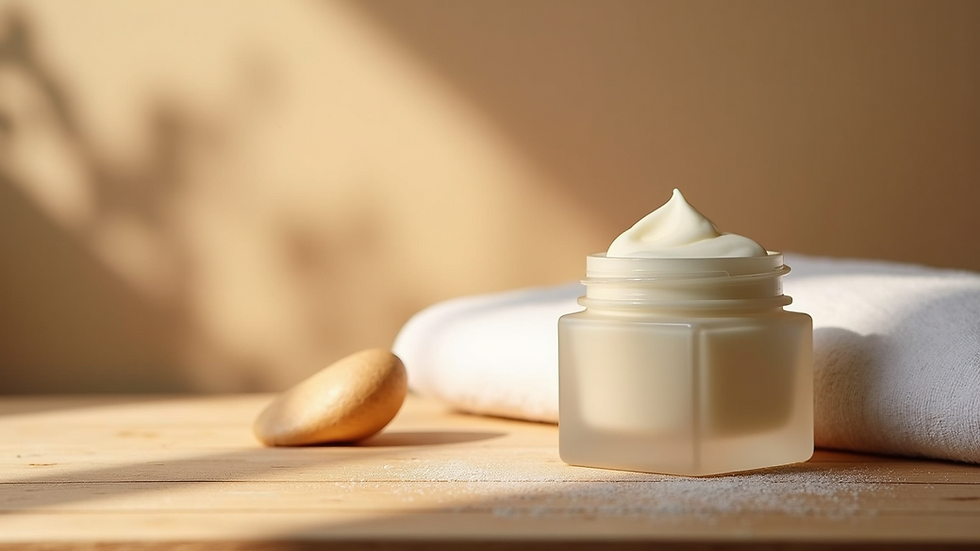How to Effectively Repair Your Damaged Skin Barrier and Restore Its Health
- Kristina TOSEVSKA

- Sep 7, 2025
- 3 min read
The skin is our largest organ, yet many of us don’t give it the care it needs. One critical component of skin health is the skin barrier. When this barrier is compromised, it can lead to various skin issues, from dryness to increased sensitivity.
What is the Skin Barrier?
Our skin is made up of three distinct layers: the epidermis (outer layer), the dermis (middle layer), and the subcutaneous tissue (innermost layer). The skin barrier, located in the epidermis, serves as a protective seal, preventing moisture loss and blocking harmful substances.
A well-functioning skin barrier keeps the skin hydrated, soft, and resilient. However, when damaged, the skin can become dull and uneven. Research shows that a compromised barrier can lead to increased transepidermal water loss, resulting in a dry skin condition known as xerosis. Additionally, the ability to retain vital elements like ceramides and fatty acids diminishes, making the skin more susceptible to environmental stressors.
A healthy skin barrier is also essential for managing signs of aging and pigmentation. If it's compromised, efforts to address these issues may fall short.
Signs of a Damaged Skin Barrier
Identifying a damaged skin barrier is the first step toward recovery. Common signs include:
Dryness and Flakiness: Your skin may feel tight, rough, or appear flaky.
Redness and Irritation: Increased sensitivity may cause redness and discomfort.
Breakouts: A weakened barrier can lead to acne and other blemishes, as it struggles to regulate oil.
Itching: Chronic itchiness may indicate that your skin is in distress.
If you observe these symptoms, taking action is crucial for restoring your skin’s health.

How to Repair a Damaged Skin Barrier
1. Stop Using Active Ingredients
To begin the repair process, cease using products with active ingredients like retinoids, acids, and exfoliants. While these can be beneficial for skin concerns, they can also worsen irritation in a compromised barrier. Instead, choose soothing products that focus on regeneration. Look for ingredients that include:
Fatty Acids: They help replace the skin’s natural oils.
Cholesterol: This essential lipid supports the skin barrier's structure, enhancing moisture retention.
Ceramides: These molecules lock in moisture and strengthen the barrier.
Hyaluronic Acid: This humectant draws moisture into the skin, keeping it plump and hydrated.
2. Choose the Right Moisturizer
Selecting an effective moisturizer is vital for skin barrier repair. Look for creams or ointments free from fragrances and harsh chemicals; they are better than lotions because they create a thicker protective layer. Products like CeraVe Moisturizing Cream, which contain ceramides and fatty acids, have been shown to improve barrier function in clinical studies.
3. Hydrate from Within
Your skin’s health also depends on internal hydration. Aim to drink at least 8 cups (64 ounces) of water daily. Include foods rich in omega-3 fatty acids, such as salmon (which contains about 2,200 mg of omega-3 per serving), walnuts, and chia seeds. Additionally, consider omega-3 supplements like fish oil or flaxseed oil if your diet is lacking these nutrients.
4. Avoid Hot Showers
Though they feel soothing, hot showers can strip your skin of natural oils. Instead, use lukewarm water and limit your shower time to 10 minutes or less. This helps maintain your skin’s moisture balance.
5. Be Gentle with Your Skin
When washing your face, opt for a gentle, non-foaming cleanser that will not disturb the barrier. Avoid scrubbing or using harsh exfoliants, these can aggravate irritation. After cleansing, pat your skin dry with a soft towel rather than rubbing it.
6. Incorporate a Humidifier
If you live in a dry climate or face harsh winter air, a humidifier can be a game changer. This device helps maintain moisture in the air, benefiting your skin. Using one while you sleep can significantly improve your skin's hydration levels overnight.
7. Protect Your Skin
Lastly, protect your skin from environmental stressors by applying a broad-spectrum sunscreen daily, even on cloudy days. An effective sunscreen blocks up to 98% of harmful UV rays, preventing further damage and helping to maintain a healthy skin barrier.
Restoring Your Skin Barrier Health
Repairing a damaged skin barrier requires time and commitment, but with the right approach, you can enhance your skin’s vitality. Focus on avoiding harsh products, selecting the right ingredients, and adopting gentle skincare practices. Remember, your skin reflects your overall health, treat it with care.
Through consistent effort and thoughtful product choices, you're on your way to achieving a healthier, more radiant complexion. If you're unsure about your skincare routine or if your symptoms persist, consider consulting a dermatologist. Your skin will appreciate it!



Comments